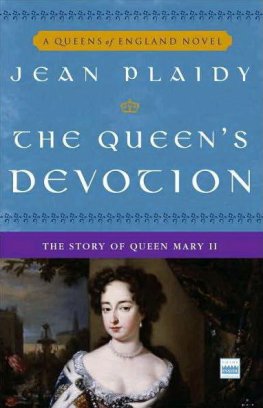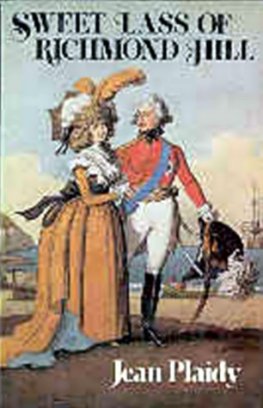Viktoriya Holt - The Captive Queen of Scots
Here you can read online Viktoriya Holt - The Captive Queen of Scots full text of the book (entire story) in english for free. Download pdf and epub, get meaning, cover and reviews about this ebook. genre: Romance novel. Description of the work, (preface) as well as reviews are available. Best literature library LitArk.com created for fans of good reading and offers a wide selection of genres:
Romance novel
Science fiction
Adventure
Detective
Science
History
Home and family
Prose
Art
Politics
Computer
Non-fiction
Religion
Business
Children
Humor
Choose a favorite category and find really read worthwhile books. Enjoy immersion in the world of imagination, feel the emotions of the characters or learn something new for yourself, make an fascinating discovery.

- Book:The Captive Queen of Scots
- Author:
- Genre:
- Rating:5 / 5
- Favourites:Add to favourites
- Your mark:
- 100
- 1
- 2
- 3
- 4
- 5
The Captive Queen of Scots: summary, description and annotation
We offer to read an annotation, description, summary or preface (depends on what the author of the book "The Captive Queen of Scots" wrote himself). If you haven't found the necessary information about the book — write in the comments, we will try to find it.
The Captive Queen of Scots — read online for free the complete book (whole text) full work
Below is the text of the book, divided by pages. System saving the place of the last page read, allows you to conveniently read the book "The Captive Queen of Scots" online for free, without having to search again every time where you left off. Put a bookmark, and you can go to the page where you finished reading at any time.
Font size:
Interval:
Bookmark:
I
The Prelude
BURN THE MURDERESS!
The words were still echoing in Marys ears as she rode through the night. Her hair had escaped from beneath her hood; the wind tore at it, tossing it this way and that with as little respect as she herself had been treated so recently in her capital city of Edinburgh. Beneath her cloak her gown was in shreds; she herself had torn it from her shoulders in a frenzy of despair as she had stood at the window of the Provosts house while the mob shouted below. She could still see their cruel faces, the red glow from the torches reflected in their eyes, while they shouted: Burn the adulteress!
Not one friend among them, she had thought. Is there no one in this cruel and barbarous land to help me?
Maitland of Lethington had walked shamefacedly on the other side of the road. He was the husband of her dear Mary Fleming who, with Mary Beaton, Mary Livingstone and Mary Seton had been one of her four devoted Marys, those who had shared their childhood with her. She had cried for help to Maitland but even he had passed by.
So there was no one. Bothwell had fled. She dared not think of Bothwell, for that would reawaken more turbulent emotions. Where was he now, the man who had taken her by force, the man who had arrogantly linked his life with hers, to her degradation and destruction? Yet would she have cared about that if he were with her now?
But if he were with her now her enemies would not have dared to treat her thus. She would not be riding through the darkness, their prisoner.
Surely Moray, her half-brother, would come to her rescue. Where was Moray? Where there was no trouble! Could it be accidental that always where there was trouble Moray was not. He is after all my brother, she thought; whatever happens he must always remember that.
But she was too tired for thought; she was exhausted by fear and rage, by despair . . . yes and even hunger; she had forgotten when she had last eaten; she had not thought of food since before Carberry Hill, that decisive battle which had brought her to this state. She had been exultant before the battle, believing that she must be victorious because Bothwell was at her side. But even he, magnificently virile as he was, could not fight an army when his own followersand hershad deserted to the enemy. There had been nothing but disaster since Darnleys death and, because it was generally believed that she had played a part in his murder, it was easy enough to turn her army against her. Yet she had been confident because Bothwell had been with her; brave, defiant, cruel, he was ruthless and unfaithful; all knew it, and she herself had reluctantly and most bitterly learned it, but there was not a braver man on either side of the Border, not a braver man on Earth.
He obsessed her as he had ever since, with his Borderers audacity, he had forced his way into her apartment and committed rapethe rape of the Queen.
Leave him, they had said. He shall go free if you will return with us to Edinburgh.
And like a fool she had believed them, although he had not.
She would remember that last fierce embrace as long as she lived, for there would never be another like him.
Fool! he had cried. He had treated her as a Queen only on State occasions; in private she was a foolish woman completely under his domination. Dont you see they want only to separate us so that they may more easily destroy you. Leap onto your horse. Well escape them yet. Well go to Dunbar . . . together.
No! she had cried, although she had longed to ride with him. They would have killed him. They longed to kill them both. They had offered her his life if she would deliver herself into their hands that they might inflict that which was more bitter than death: the humiliation, the degradation which they were forcing her to suffer now.
So she had parted from him. He had escaped to . . . she knew not where; and for her there had been the terrible journey to the Provosts house, the night of horror there, in the room which looked on the street; and placed outside her window was that hideous banner on which was depicted the murdered Darnley and her little son Jameshers and Darnleyskneeling as he prayed Judge and revenge my cause, O Lord! And all through the night the mob roared for her destruction like wild beasts roaring for their prey.
In the morning she had followed the fearful walk to Holyrood House, the banner held before her, the mob pressing close.
That was the very depth of despair. There could be nothing more horrifying than that which she had already suffered. But perhaps there could be.
On she rode, the prisoner of those grim and silent men . . . to what destination?
II
Lochleven
IN THE CASTLE OF LOCHLEVEN which was built on an island in the middle of the loch an exciting expectancy prevailed.
All through the day, the serving men and maids had been aware that they must prepare for an important visitor, and rumor had seeped through to them that this was none other than the captive Queen. Ears were strained for the sounds of arrival; eyes continually turned to the strip of water which separated the island from the mainland on which could be seen the roofs of the houses of Kinross. She would embark there and the boat was ready, waiting for her.
The castellan of the castle, Sir William Douglas, was uneasy; he did not relish the responsibility which had been given him; he foresaw trouble. Yet it was a commission which he dared not refuse; he should, he supposed, have been grateful because his half-brother, James Stuart, Earl of Moray, would wish him to be the Queens jailor. Yet he knew that a tense and stormy period lay before him. Wherever Mary Stuart was, there was trouble; it was hardly likely that Lochleven would escape it.
Now he was waiting for her arrival which surely could not long be delayed; and he decided that once more he must impress upon his mother the importance of the task which had been given them; and for this reason he made his way to her apartments.
He found her seated at a window; like most people in the castle she was gazing out across the lake, and with her was Williams younger brother George.
Margaret Douglas looked eagerly at her elder son as he entered. He noticed with a twinge of jealousy that she looked younger than she had before they had received the news. He knew the reason; it was because, by keeping the Queen a prisoner at Lochleven, she would be serving Moray. Why had he felt the need to warn her of the importance of this duty when all that she did for Moray she would do well?
Is there news? she asked, and the animation on her beautiful, though aging face, was startling.
William shook his head.
I trust all will be well. Jamie will expect us to do our duty.
We shall do it, have no fear of that, William replied. He might have reminded her that Moraynow that the Queen was a captivewas the most influential man in Scotland, that before long he would be the ruler of Scotland, which was what he had always intended to be. If one hoped to live in peace in Scotland, one must obey Moray; he, William Douglas, castellan of Lochleven since the death of his father, Sir Robert Douglas, would have been prepared to do that even if Moray had not been his half-brother, and his mothers bastard.
Jamie will expect us to do this duty well, went on Margaret Douglas complacently.
Young George clenched his hands in disgust; he was eighteen, romantic, and chivalrous and could not bear to contemplate his mothers dishonor.
As for Margaret she was unaware of any dishonor, for in her opinion there was nothing but honor in bearing the bastard of a King. Often she delighted in Jamies resemblance to his father. She had not been the only woman to catch the roving eye of James V of Scotland and to offer the world living proof of what had passed between them. To her he had been faithful for a while and she would never forget that. She had been jealous of the others. How she had hated Euphemia Elphinstone when he had borne the King her son Robert; not that Robert was the only one. James was a King who could be gay and melancholy, and when he was gay he was very gay; there had been numerous known bastards, and even James did not know how many unknown ones. Yet, she thought wistfully, all the Stuart charm was his and to have known it was to have drunk deep of pleasure. There were no regrets. And when she looked at her JamieJames Stuart who had been Earl of Mar and was now Earl of Morayhow could she refrain from thinking what a cruel fate it was that had made him the bastard, and that giddy girl, Mary Stuart, the Kings only legitimate heir? Jamie resented itoh how bitterly. But perhaps now the bitterness was less acute.
Font size:
Interval:
Bookmark:
Similar books «The Captive Queen of Scots»
Look at similar books to The Captive Queen of Scots. We have selected literature similar in name and meaning in the hope of providing readers with more options to find new, interesting, not yet read works.
Discussion, reviews of the book The Captive Queen of Scots and just readers' own opinions. Leave your comments, write what you think about the work, its meaning or the main characters. Specify what exactly you liked and what you didn't like, and why you think so.


